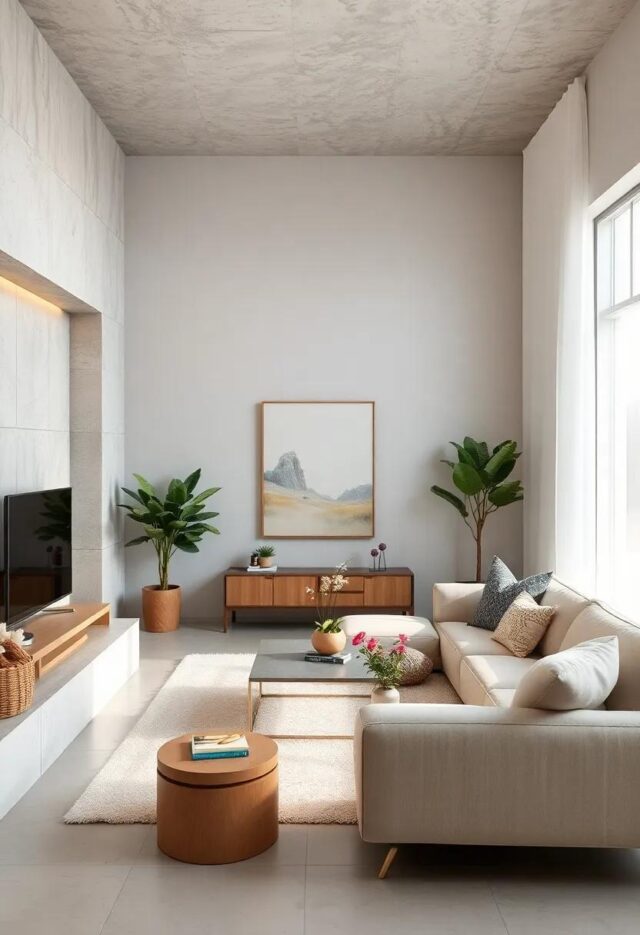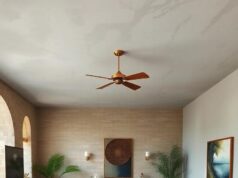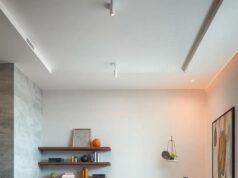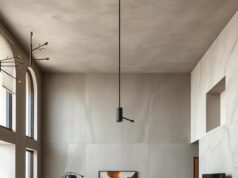In a world often cluttered with the chaos of life, the allure of simplicity has never been more enchanting.A minimalist approach to interior design invites a breath of fresh air into our living spaces, turning the everyday into the extraordinary. When it comes to small living rooms, the challenge lies not just in making the most of limited square footage, but also in crafting an environment that feels open and inviting.”” explores the delicate balance between function and aesthetics, guiding you through the principles of minimalist design. This article will unveil how thoughtful choices in color, furniture, and decor can transform a cozy nook into a serene sanctuary, were light dances freely and tranquility reigns supreme. Join us as we delve into the art of creating a harmonious space that reflects the beauty of simplicity.
Embracing Natural Light Through Large Windows in a Minimalist Living room
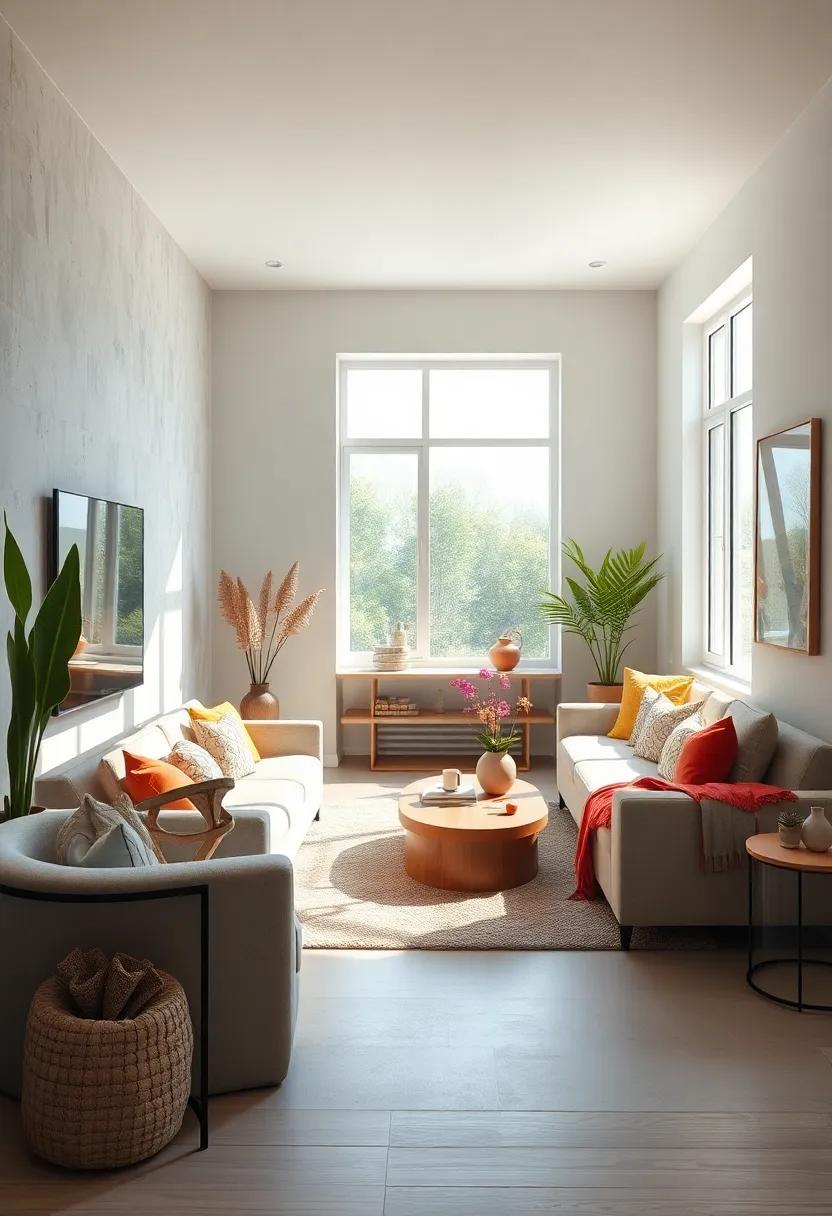
Large windows can transform a minimalist living room into a serene sanctuary by allowing an abundance of natural light to flood the space. This not only creates an airy atmosphere but also emphasizes the simplicity and elegance of minimalist design. imagine lounging on a neutral-toned sofa while sunlight dances across polished wooden floors, highlighting the textures of carefully curated décor. To fully embrace this concept, consider the following elements:
- Open Spaces: Ensure that your furniture placement does not obstruct the windows.
- light Fabrics: Choose sheer curtains or opt for blinds that can be fully retracted during the day.
- Reflective Surfaces: Incorporate mirrors or glass accents that amplify the influx of natural light.
By integrating large windows, you not only invite the outside in but also promote a sense of connection with nature.The changing light throughout the day adds a dynamic element to your living room, enhancing the overall mood and experience of the space.To complement the natural illumination, consider a color palette that resonates with the light, such as soft whites, muted pastels, or gentle earth tones. Hear’s a brief comparison of color choices and their effects:
| Color | Effect on Space |
|---|---|
| Soft White | Brightens and enlarges the space |
| Pale Blue | Creates a tranquil and relaxing atmosphere |
| Warm Beige | adds warmth without overwhelming the senses |
Choosing a Soft color Palette for an Airy Ambiance in Small Spaces
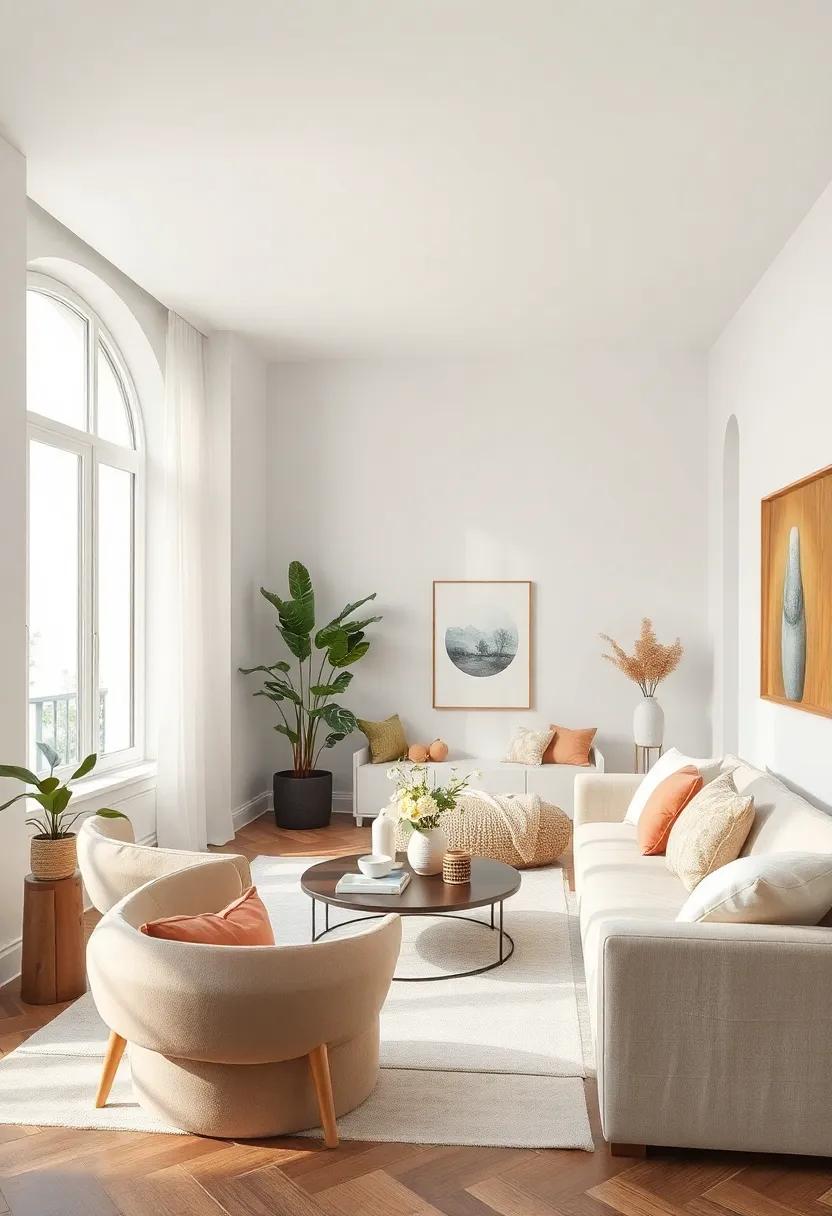
When it comes to creating an airy ambiance in small spaces, the choice of color palette plays a critical role. Opting for soft hues can elevate the overall feel of the room, making it appear larger and more inviting. Consider incorporating shades like pale blues, gentle greens, or soft grays. These colors not only evoke a sense of calm but also reflect light, enhancing the sense of openness. Here are a few suggestions for your selection:
- Light Pastels: Choose blush pinks or mint greens for a fresh touch.
- Whites and Creams: Create a clean, crisp look with off-whites or cream.
- Subtle Neutrals: Utilize light taupes or warm beiges to add warmth without overwhelming the space.
In addition to selecting the right shades, consider the impact of texture and layering in your small living room.Using materials such as light linen, soft cotton, or smooth woods in your furnishings can further enhance the airy feel. A well-placed accent wall in a slightly bolder muted tone can provide depth while maintaining the overall lightness. Below is a simple color combination table to inspire your design choices:
| Color Pairing | Effect |
|---|---|
| Pale Blue & White | Calming and refreshing |
| Soft Gray & Blush Pink | Elegant and welcoming |
| light Green & Cream | natural and serene |
Incorporating Multifunctional Furniture for Effortless Simplicity
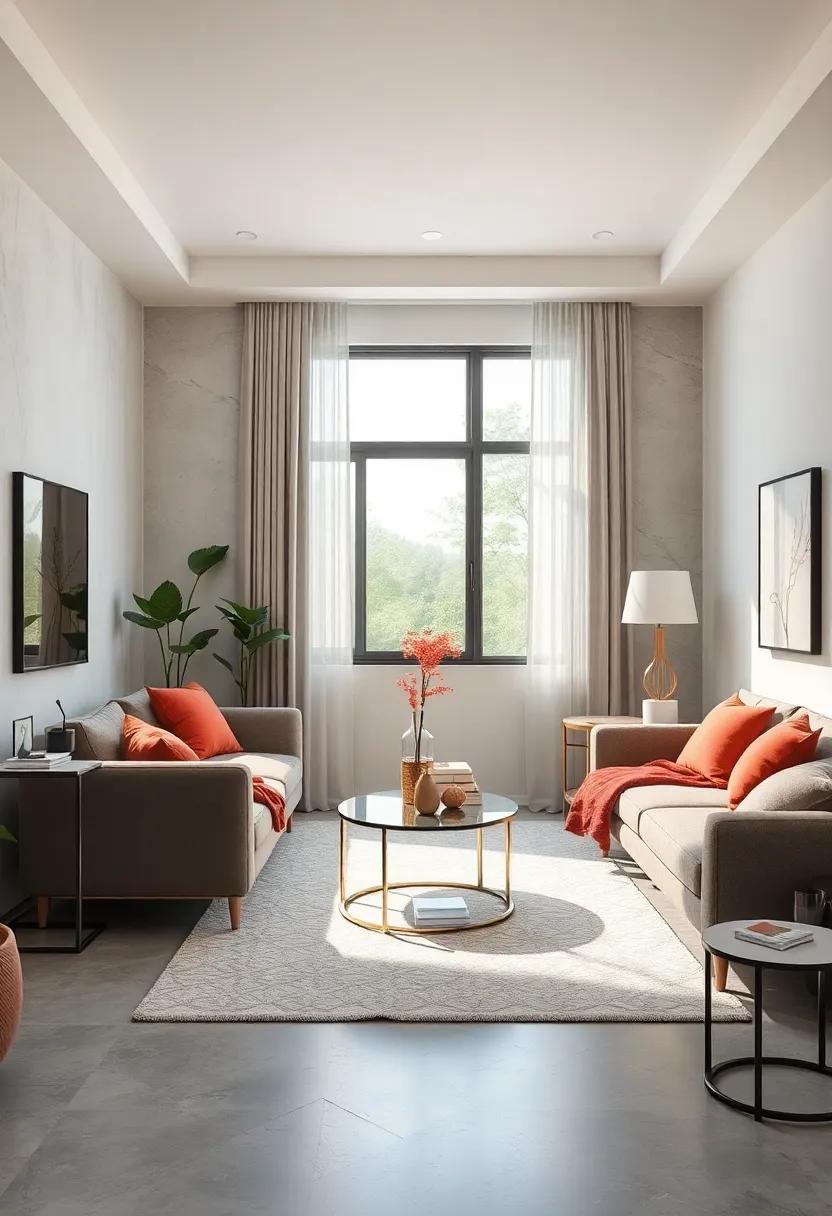
In the quest for a minimalist small living room, multifunctional furniture emerges as a hero, effectively marrying form and function without overwhelming the space. Consider investing in pieces that offer more than one use, allowing you to keep the room uncluttered while enhancing its usability. For example:
- Sofa beds that transform into a comfortable sleeping space for guests
- Ottomans that serve as both a coffee table and extra seating
- Bookshelves with foldable desks that create a workspace when needed
By thoughtfully selecting items that simplify everyday living, maintaining a light and airy aesthetic becomes effortlessly achievable. Not only do these versatile furnishings minimize excess, but they also encourage practical organization. A well-placed storage bench can hide away throws and pillows, while side tables with drawers can efficiently store miscellaneous items, keeping the floor space open and inviting. Here’s a simplified view of some recommended multifunctional furniture:
| Furniture Type | Primary Function | Secondary Function |
|---|---|---|
| Sofa Bed | Sitting | Sleeping |
| Storage Ottoman | Seating | Hidden Storage |
| folding Desk | Workspace | compact Storage |
Balancing Textures to Create Warmth in a Minimalist Design
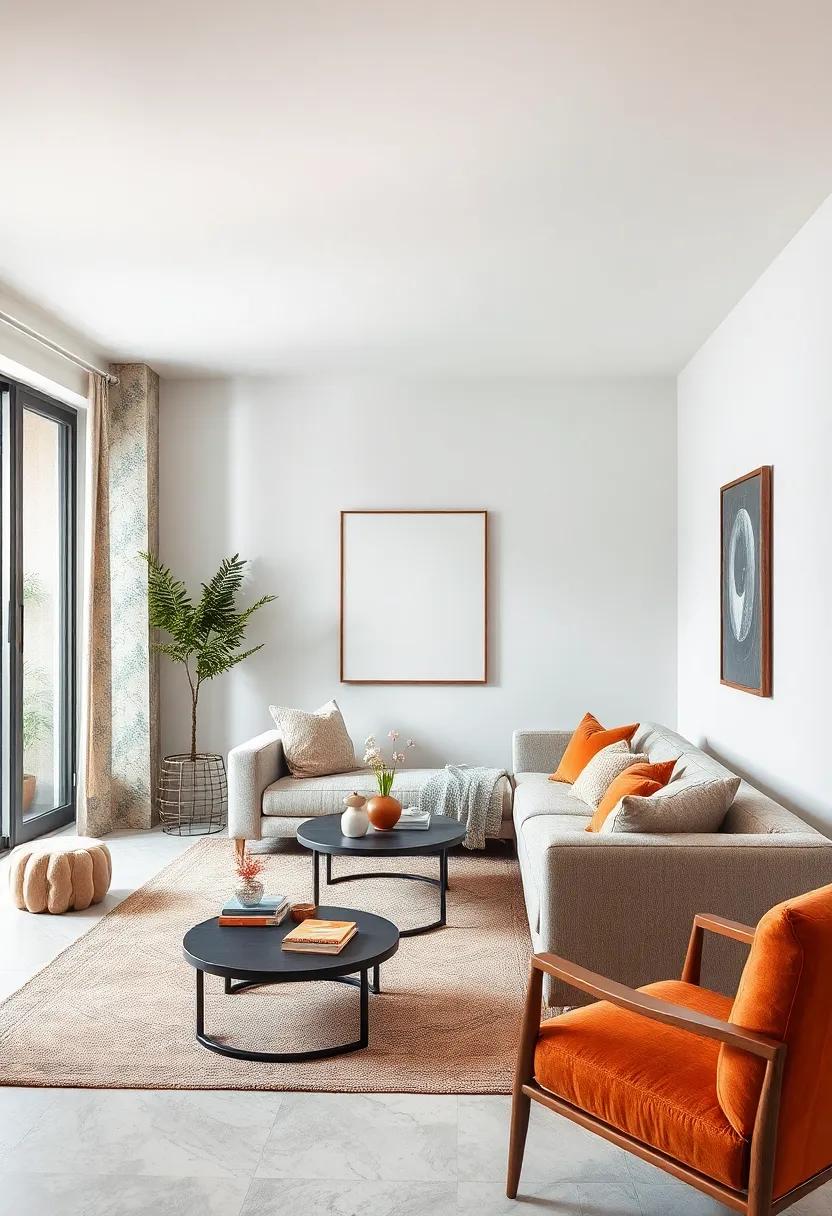
In a minimalist small living room, the key to achieving a cozy ambiance lies in the careful balancing of different textures. Incorporating elements such as soft textiles, natural wood, and ceramic finishes can create visual interest while maintaining the simplicity inherent in minimalist design. Consider using a mix of materials like plush throws, woven rugs, and sleek furniture to invite warmth. By thoughtfully layering these textures, you can create a space that feels both inviting and spacious, balancing the oft-sterile feel that minimalism can sometimes conjure.
To illustrate this concept further, think about the following elements you can easily mix and match:
- Fabrics: cotton, linen, and wool for textiles can bring softness.
- Wood: A light oak coffee table paired with darker wood accents can add depth.
- Metals: Brass or matte black fixtures can add a modern touch while providing warmth.
- Plants: Incorporating greenery can enhance both texture and natural warmth.
by selecting each piece with intention,you’ll foster an environment that feels both light and grounded,striking a harmonious balance that reflects both simplicity and comfort.
Strategic Layout Ideas to Maximize Space and Functionality
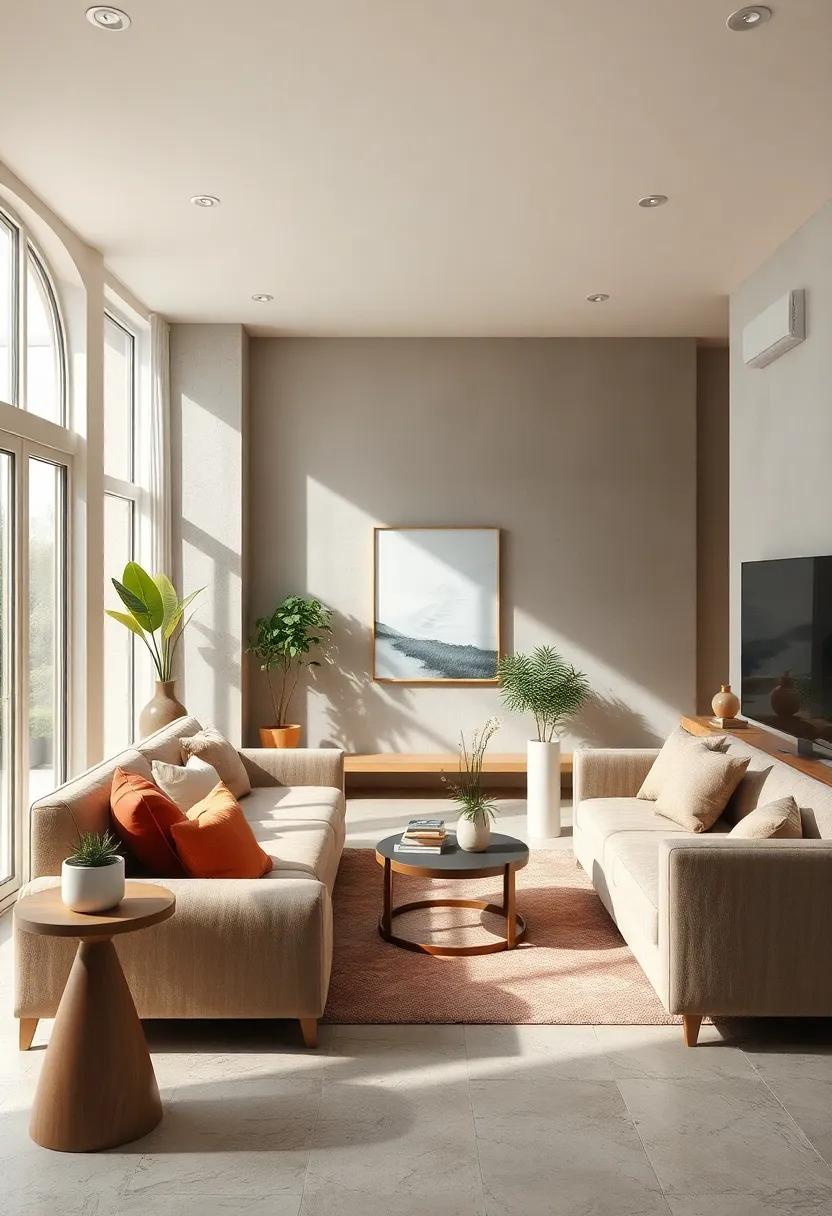
To achieve a harmonious blend of space and functionality in your small living room, it’s essential to think strategically about your layout.Start by prioritizing furniture placement that encourages flow and openness. Consider floating furniture away from walls, which can create a sense of depth and movement. This approach allows for easier circulation while maximizing your floor area. Here are some tips for effective furniture arrangement:
- Use multi-functional furniture like an ottoman that can serve as seating and storage.
- Place your seating in a U-shape to foster conversation and connection.
- Incorporate vertical storage solutions, such as shelving units or tall bookcases that draw the eye upward.
consider the importance of light in enhancing the feeling of spaciousness. use light, airy colors for walls and furnishings to reflect natural light. Accessorize with mirrors strategically placed to bounce light around the room, creating the illusion of expanded space. Additionally, opt for minimalist decor that maintains the uncluttered vibe of your living area. Here’s a simple comparison of effective color palettes:
| Color Palette | Effect |
|---|---|
| soft Whites & Creams | Enhances light and warmth |
| Pale Blues & Greens | Creates a serene atmosphere |
| Pastel Accents | Adds subtle character without overwhelm |
Utilizing Open Shelving to Maintain a Clean and Airy Aesthetic
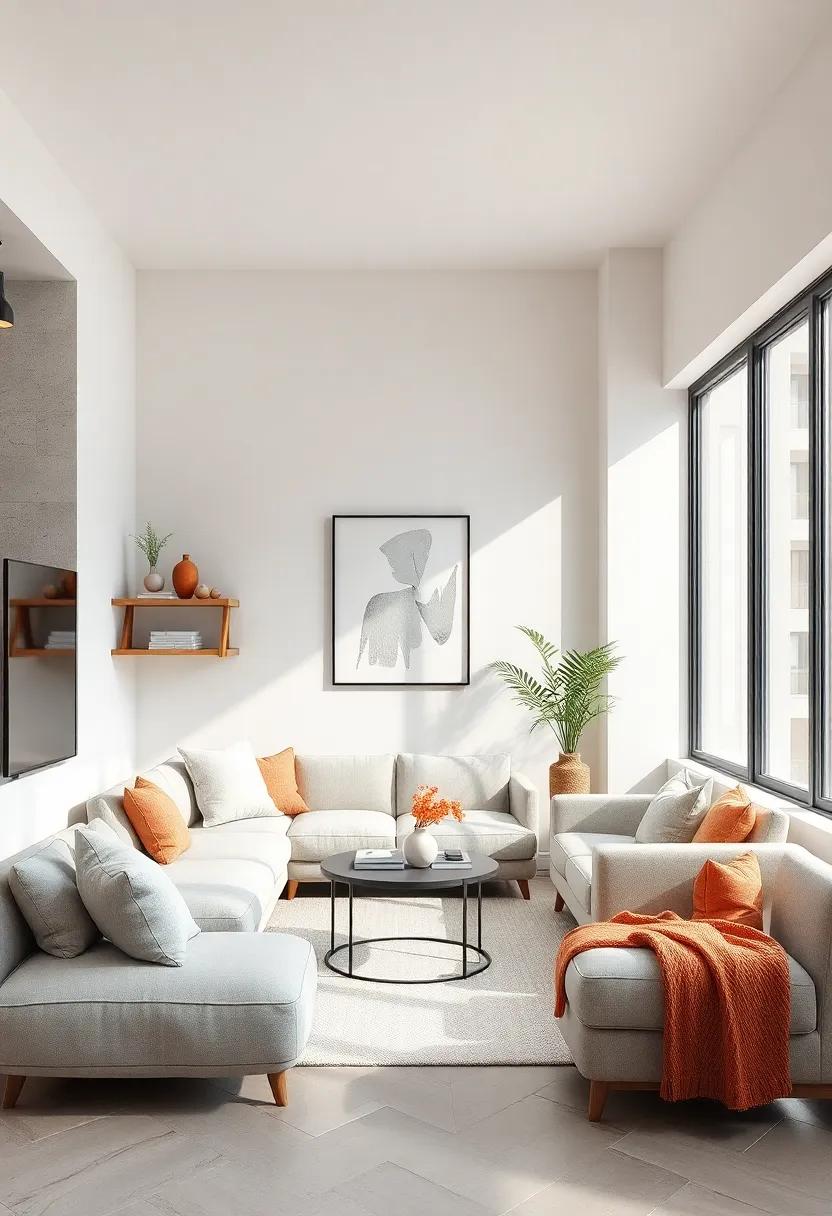
Open shelving is a transformative element that can drastically enhance the aesthetic of a small living room. By replacing bulky cabinets or traditional shelving units with open shelves, you not only create a sense of depth but also promote a light and airy atmosphere. Displaying a curated selection of items, such as your favorite books, decorative vases, or plant arrangements, allows you to showcase your personality while keeping the space visually uncluttered. To maintain this sleek look, consider using neutral color palettes and cohesive materials across your displayed items.
To further enhance the airy feel, it’s essential to choose the right shelving material and configuration. Opt for lightweight, minimalist shelves made from natural wood or metal finishes that don’t overpower the visual space. Incorporating a mix of textures can also add depth without compromising the minimalist vibe. Here’s a quick guide to creating a harmonious open shelving display:
| Item Type | Suggested Color/Material | Placement Tip |
|---|---|---|
| Books | Soft pastels/White | Stacked horizontally for balance |
| Plants | Greenery with ceramic pots | Vary heights for visual interest |
| Decorative Vases | Clear glass/Muted ceramic | Group in odd numbers for harmony |
The Power of Negative Space in a Minimalist Living Room
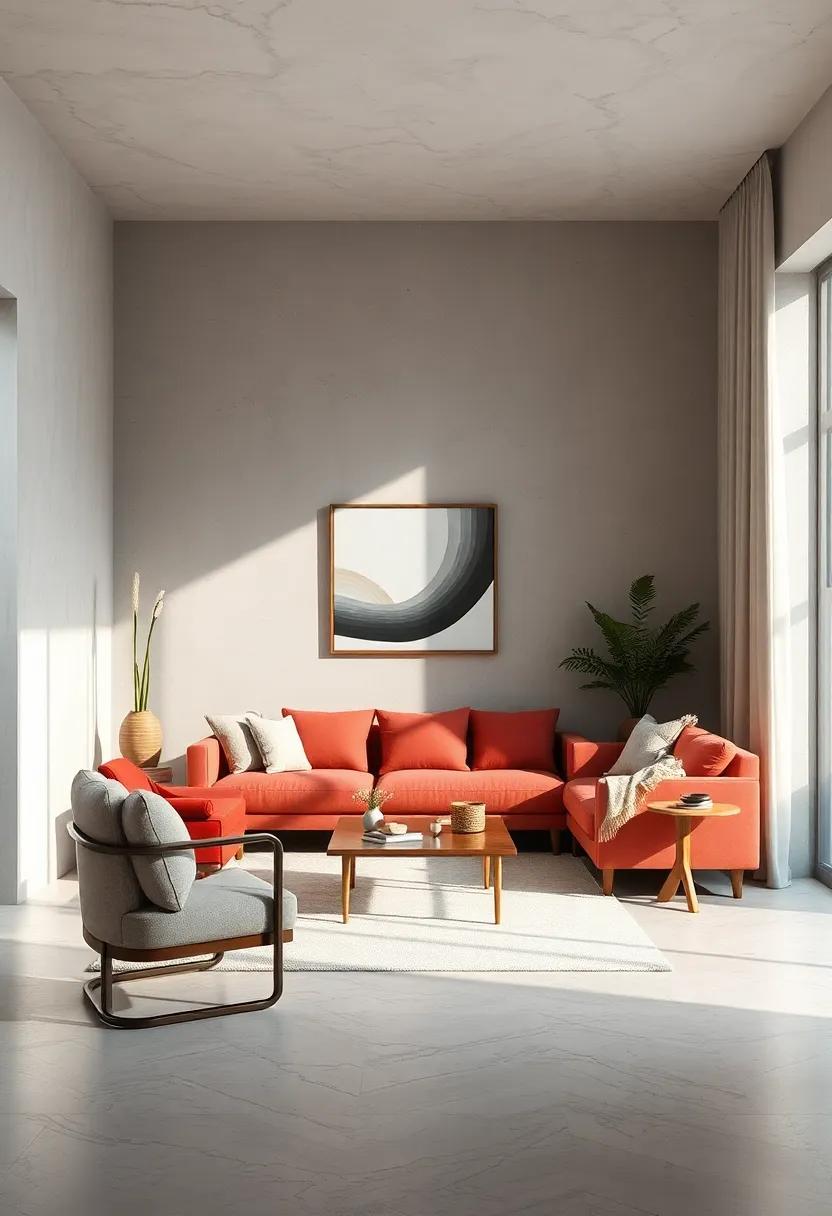
In the realm of minimalist design, the art of utilizing negative space is paramount. This intentional use of “empty” areas allows the eye to rest, creating a sense of tranquility in a small living room. By strategically placing furniture and decor,you can highlight the beauty of simplicity. Consider the following elements to enhance the feeling of space:
- Furniture Selection: opt for streamlined pieces that do not overwhelm the space.
- Color Palette: Use light, neutral colors that contribute to an airy ambiance.
- Decluttering: Keep surfaces clear and limit decorative items to those that truly resonate.
Moreover, the arrangement of your furnishings plays a critical role in how negative space is perceived. Avoid overcrowding by allowing adequate breathing room between items, which can enhance the overall aesthetic. A well-placed coffee table or a single accent chair can offer both functionality and style without detracting from the openness of the room. Consider this simple table that illustrates how to balance space and function:
| Element | Purpose | Example |
|---|---|---|
| Accent Chair | Creates a focal point | Single,modern chair |
| Coffee Table | Offers utility without bulk | Glass-top,minimalist design |
| Area Rug | Defines space | Light-colored,textured rug |
Enhancing the Atmosphere with Thoughtful Lighting Choices
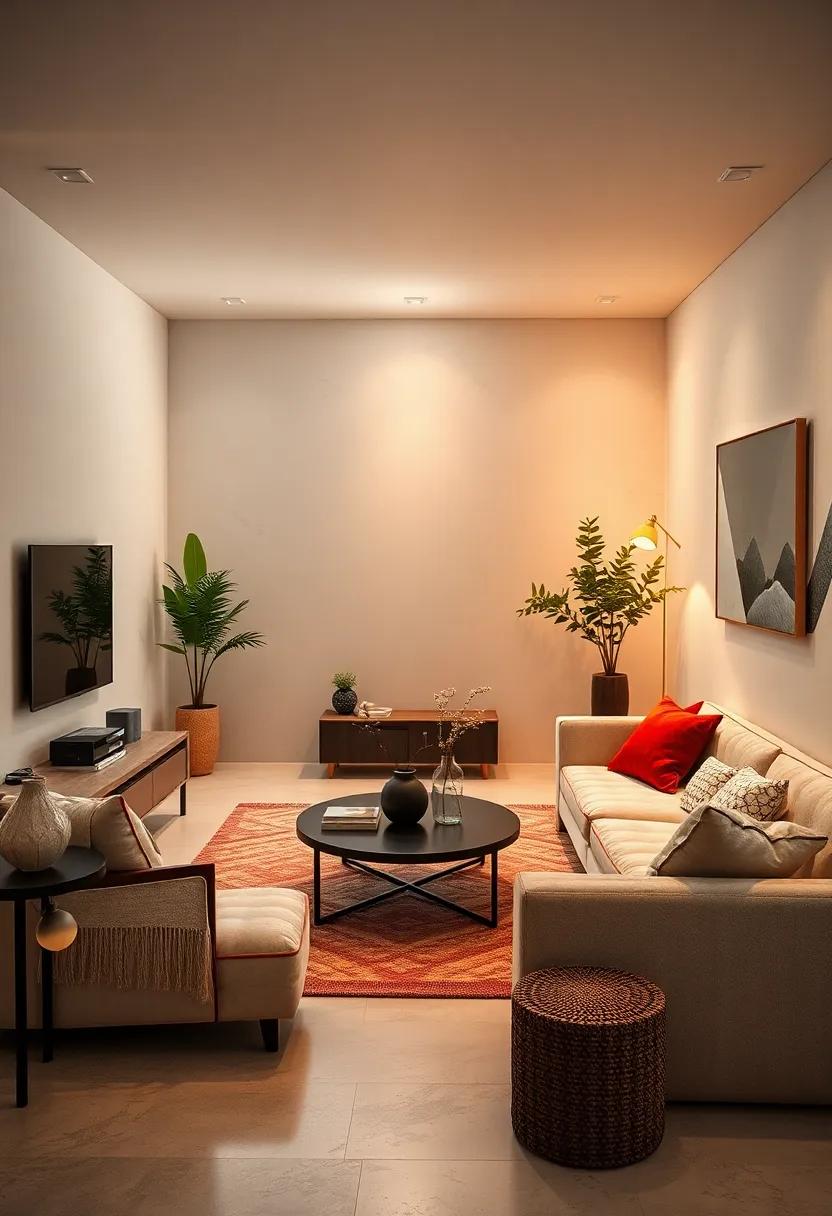
Lighting plays a crucial role in defining the essence of a minimalist living space, where the emphasis is on simplicity and tranquility. To create a light and airy feel, consider a combination of natural and artificial lighting sources. Large windows can usher in daylight,while soft,diffused lighting options—such as wall sconces and table lamps with warm-toned bulbs—offer a cozy ambiance during the evening. Additionally, reflective surfaces, like mirrors and glass decor, can amplify the effects of natural light, enhancing the overall openness of the area.
When selecting fixtures, opt for those with clean lines and understated designs to maintain the minimalist aesthetic. Here are some lighting choices that align seamlessly with a simple living room:
- Recessed Lighting: Offers an unobtrusive option that blends into the ceiling.
- Floor Lamps: A tall, slender design can provide verticality without cluttering the space.
- Pendant Lights: A single, sleek pendant can serve as a focal point above a coffee table.
By carefully curating your lighting elements, you can foster an inviting environment that truly embodies the spirit of minimalism without sacrificing warmth or style.
Creating Focal Points with Minimalist Artwork and Decor
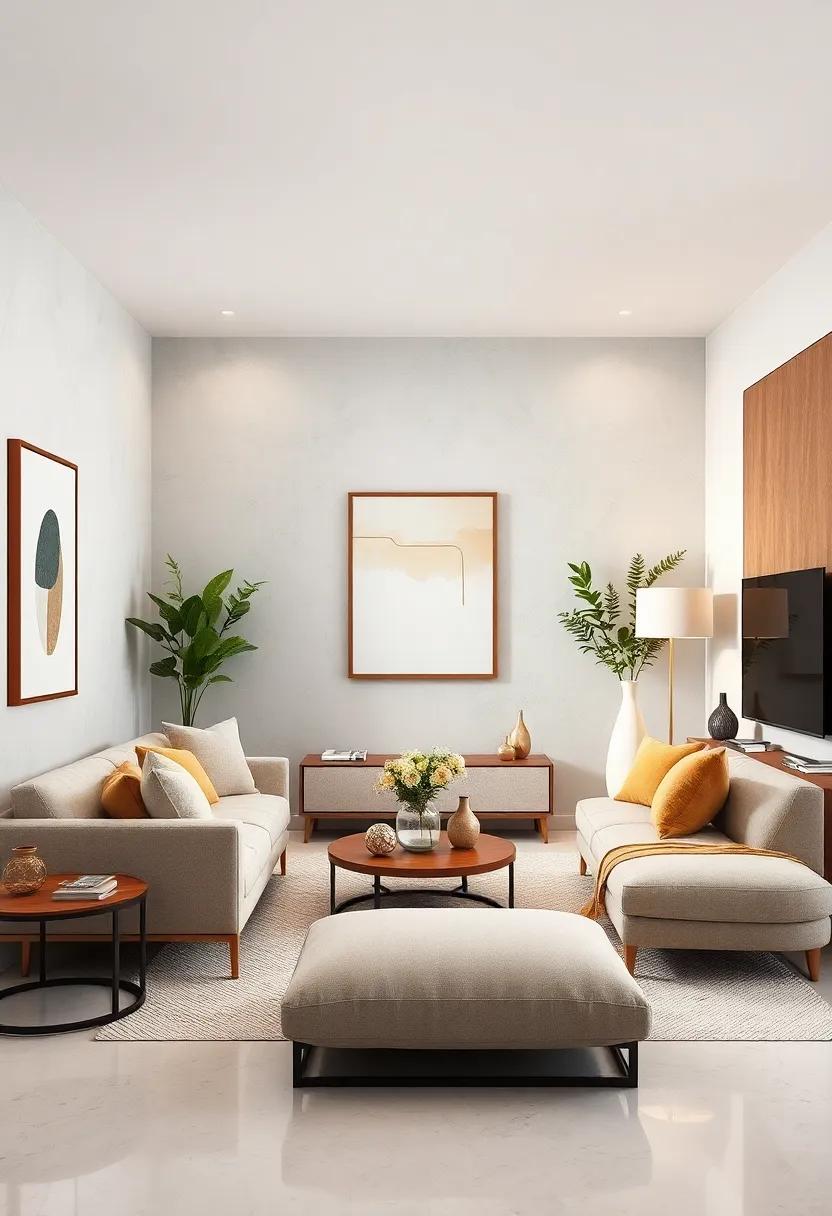
In a minimalist living room, creating a focal point is essential to draw the eye and instill a sense of harmony. Consider utilizing large, statement art pieces that encapsulate simplicity yet provoke thought. These artworks can serve as conversation starters and enhance the overall ambiance of the room. Look for pieces that feature clean lines, subtle colors, or abstract shapes, which harmonize with the minimalist ethos while adding a touch of personality. Strategically placing a single, eye-catching piece on a main wall can anchor the space, making it feel both complete and inviting.
In addition to art, complement your focal point with thoughtfully chosen decor items that enhance rather than clutter the space. Opt for a few select items such as:
- Geometric vases in muted tones
- Textured throw pillows that add warmth
- Natural wood or stone accents for an organic touch
This careful curation of minimal decor not only highlights the artwork but also contributes to the airy feel of the room. The key is to maintain a balance, allowing each element to breathe and resonate within the space’s overall design.
Selecting Lightweight Fabrics for Curtains and Upholstery
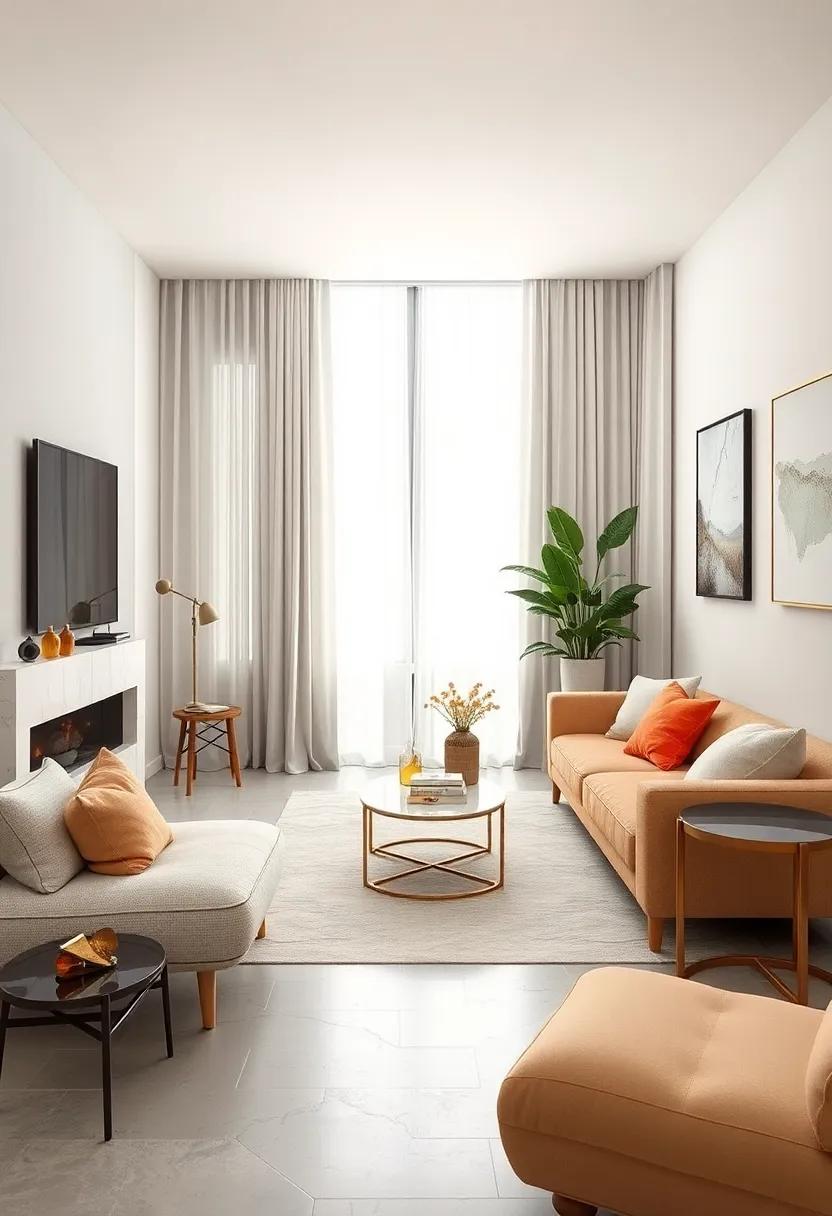
Choosing the right fabric for your curtains and upholstery can transform your small living room into a light and airy haven. Lightweight fabrics not only enhance the overall aesthetic but also contribute to a sense of spaciousness. Consider the following materials that work beautifully for this minimalist approach:
- Sheer Cotton: Offers a soft, delicate appeal while allowing natural light to filter in.
- Linen: Breathable and textured, it adds a casual elegance to your decor.
- Muslin: A versatile and affordable option, perfect for creating a layered look.
- Silk Blend: Provides a luxurious touch with a lightweight feel, ideal for accent pieces.
When selecting your fabric, keep in mind how colors and patterns can influence the overall atmosphere. Opt for light shades like whites, pastels, and soft neutrals to foster an airy appeal. Here’s a quick guide to help you visualize different fabric options and their effects:
| fabric Type | Light Transmission | Textural Quality |
|---|---|---|
| Sheer Cotton | High | Smooth |
| Linen | Medium | Textured |
| Muslin | High | Soft |
| Silk blend | Medium | Lustrous |
Natural Elements to Bring the Outdoors Inside Effortlessly
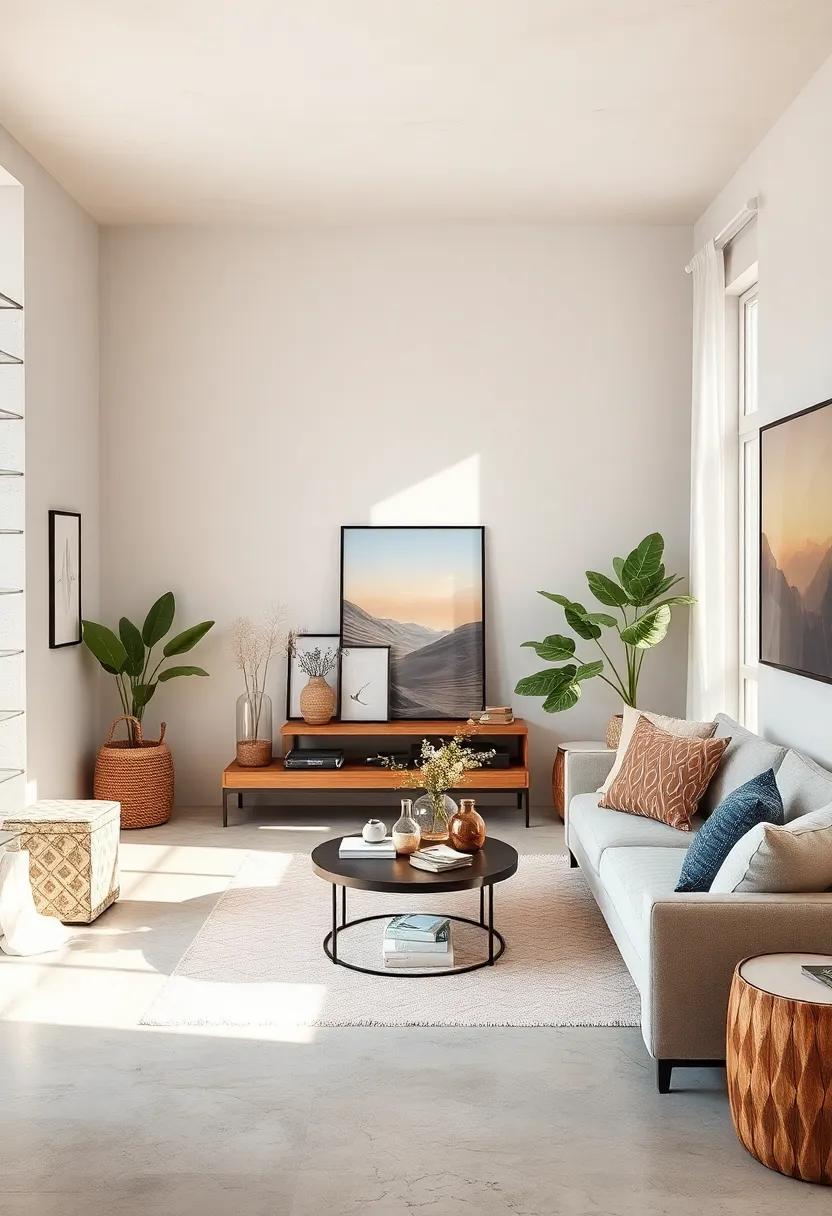
Incorporating natural elements into your small living room can transform the space into a tranquil oasis. Start by selecting plants that thrive in indoor environments. Consider adding air plants or succulents, which require minimal maintenance and add a touch of greenery without overwhelming the space.Decorative planters with earthy tones can blend seamlessly with your minimalist décor. Including natural wood accents—such as a reclaimed coffee table or wooden shelving—can also imbue warmth while maintaining a simple aesthetic.
To enhance the connection between your living room and the outdoors, introduce elements that reflect the changing seasons. Using textiles in organic materials,like linen or cotton,can invoke a sense of comfort. You might also consider showcasing seasonal flowers in understated vases on your coffee table. An elegant touch could be a small rock or pebble arrangement on a windowsill, serving as a reminder of nature’s beauty. Here’s a quick reference guide to help you select effective elements:
| Natural Element | Benefits |
|---|---|
| Indoor Plants | Purge indoor air, enhance decor |
| Wood Accents | Add warmth, texture, simplicity |
| Natural Textiles | Comfort, freshness, seasonal change |
| Rock Arrangements | Subtle decor, calming presence |
Incorporating Plants for a Touch of Liveliness and Freshness
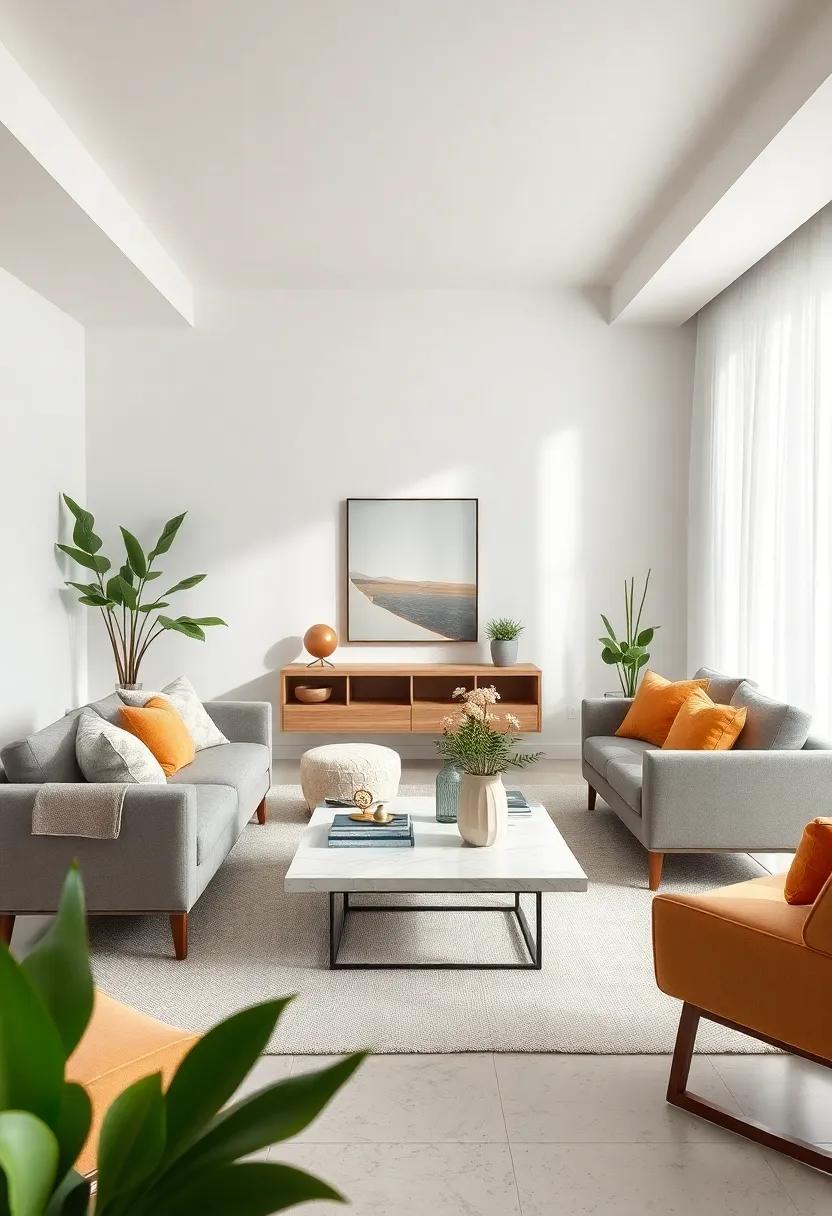
Incorporating greenery into your small living room is an effortless way to inject a sense of liveliness and freshness.Consider choosing plants that thrive in low-light conditions, ensuring they flourish without overwhelming the space. Here are some ideal candidates:
- Snake Plant: Its tall, upright leaves add height and elegance.
- Pothos: A trailing plant that brings a soft, cascading vibe.
- ZZ Plant: Requires minimal care and adds a modern touch.
- Spider Plant: Its arching leaves can create a whimsical effect.
To enhance the aesthetic, consider varied planter styles. Opt for sleek ceramic pots for a contemporary look, or rustic baskets to infuse warmth. Grouping plants in odd numbers on floating shelves or side tables can create an eye-catching focal point, while larger varieties can stand proud in a corner. Below is a simple guide to help you determine the best placement:
| Plant Type | Best Placement | Light Requirements |
|---|---|---|
| Snake Plant | Corner or shelf | Low to bright indirect light |
| Pothos | Hanging or trailing on shelves | Low to bright indirect light |
| ZZ Plant | Desk or side table | Low light |
| Spider Plant | Windowsill or shelf | Bright indirect light |
Defining Areas with Subtle Area Rugs for Visual Separation
Subtle area rugs can serve as a powerful tool to create distinct zones within a small living room, enhancing both functionality and aesthetics. By selecting rugs that harmonize with the room’s overall color palette, you can introduce a sense of continuity while still marking different areas. Consider choosing light textures that reflect the airy feel of a minimalist design, allowing spaces to feel inviting rather than constricted. A rug placed under the coffee table can delineate the seating area, while another soft hue near a reading nook can invite relaxation.
When choosing rugs for visual separation,it’s essential to focus on scale and pattern. Opt for minimalist designs that won’t overwhelm the eye, such as:
- Solid colors or muted tones
- Geometric patterns with subtle contrasts
- Natural fiber options like jute or wool for texture
Incorporating rugs into your living space not only defines areas but also adds a layer of warmth that enhances the overall ambiance. You might even create a visual cue by placing rugs of varying shapes, such as a round rug under a coffee table and a rectangular one by the sofa, to dynamically guide the flow of movement throughout the room.
Transforming Small Nooks into Cozy Reading Corners
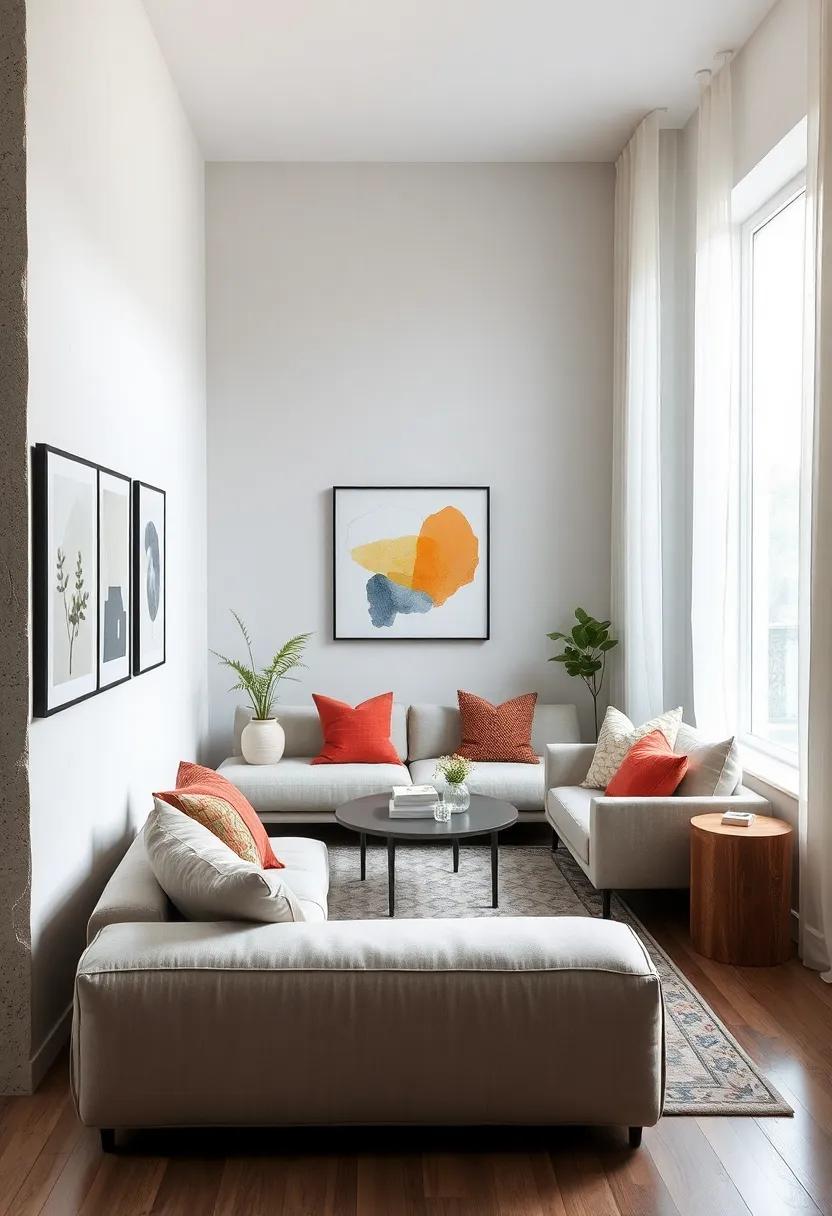
Transforming a small nook into a cozy reading corner invites relaxation and reflection into your minimalist living room.Begin by choosing a perfect spot that receives natural light throughout the day, making reading an even more delightful experience. Incorporate a comfortable chair or an oversized cushion to create a welcoming seat. Layer in textured throws and plush pillows that encourage snuggling up with your favorite book. A small side table can be added for your warm cup of tea, while a simple bookshelf—floating or a small cart—efficiently showcases your curated collection of reads, keeping the space tidy and organized.
To enhance the ambiance further, consider incorporating plant life to breathe freshness into the corner. Greenery not only purifies the air but also adds a touch of vibrancy to the calmness of your reading nook. Utilizing soft lighting, such as a floor lamp or string lights, can create a warm glow that makes evening reads enchanting. you might also wish to use wall art that resonates with your reading preferences, creating a backdrop that inspires creativity and tranquility. Your small nook, transformed into a coherent retreat, fosters a spirit of simplicity while catering to your love for literature.
Designing a minimalist Coffee table That Packs a Visual Punch
when considering a coffee table for your minimalist sanctuary, focus on clean lines and natural materials to enhance the airy aesthetic of your small living room. Opt for a design that features a low profile and subtle forms, such as a sleek, round table crafted from light-colored wood or glass.This not only creates an inviting focal point but also maintains a sense of space and fluidity. Accessories shoudl be kept to a minimum to ensure that the table doesn’t overpower the room; think of adding a single, textured vase or a sculptural piece that draws the eye without cluttering the visual landscape.
functionality is equally vital, so consider incorporating hidden storage or versatile features into your coffee table design to keep the space organized yet stylish. A table with an integrated shelf or drawers can elegantly house coasters, magazines, or even blankets, thereby preserving the minimalist ethos. Here’s a quick reference table on key features to consider when selecting the right coffee table:
| Feature | Description |
|---|---|
| Material | Light wood, glass, or metal for an airy feel |
| Shape | Simplistic, geometric forms like round or rectangular |
| Functionality | Storage options to maintain organization yet remain stylish |
| color | Neutral tones, with possibly a pop of color within a single accessory |
exploring Hidden Storage Solutions for Clutter-Free Living

In a minimalist living room, every inch matters, making hidden storage solutions essential for maintaining an uncluttered aesthetic. Consider incorporating multi-functional furniture that not only serves a purpose but also cleverly conceals your belongings. Here are some innovative options:
- Storage Ottomans: Perfect for footrests or extra seating, they can hide away blankets, magazines, or toys.
- Daybeds with Drawers: Ideal for small spaces, they double as a cozy sofa and provide under-bed storage for linens or seasonal items.
- Built-in Shelving: Utilize the vertical space by installing shelves that seamlessly blend with your wall, allowing for both decorative and functional storage.
Additionally, creative wall-mounted solutions can transform your space while hiding clutter. Consider these options for an elegant touch:
- Floating Cabinets: These provide a sleek appearance while offering hidden compartments for items you want to keep out of sight.
- Vertical Storage Baskets: Mount baskets to walls to store small items in a chic way, keeping them accessible yet organized.
- Magnetic Strips: Great for kitchens, these can hold knives or tools out of the way but within easy reach.
| Storage Solution | Functionality |
|---|---|
| Storage Ottomans | Seating + Hidden Storage |
| Daybeds with Drawers | Seating + Linens Storage |
| Built-in Shelving | Display + Storage |
Personalizing Your Space with Sentimental Minimalist Decor
Creating a serene environment begins with selecting decor that reflects personal stories while adhering to minimalist principles. Choose pieces that not only enhance the visual appeal of your space but also evoke warm memories. This could include:
- Framed photographs: Select a few of your favorite moments and display them in uniform frames to maintain a cohesive look.
- Handcrafted items: Incorporate artisan pieces that resonate with your travels or hobbies,ensuring they tell a story without overwhelming the room.
- Plants: Adding greenery brings a touch of life; consider choosing pots that complement your decor while adding a personal touch.
To keep your space feeling open and airy, opt for a limited palette of colors and materials. Utilize multifunctional furniture to minimize clutter yet enhance functionality. Create a visual balance by strategizing the placement of decor. For example, a small table can be adorned with:
| Item | Purpose |
|---|---|
| Simple candle holder | Adds warmth and ambiance |
| stack of favorite books | personal touch and conversation starter |
| Small vase with fresh flowers | Brings nature indoors, uplifting the mood |
Integrating Technology in a Discreet and Stylish Manner
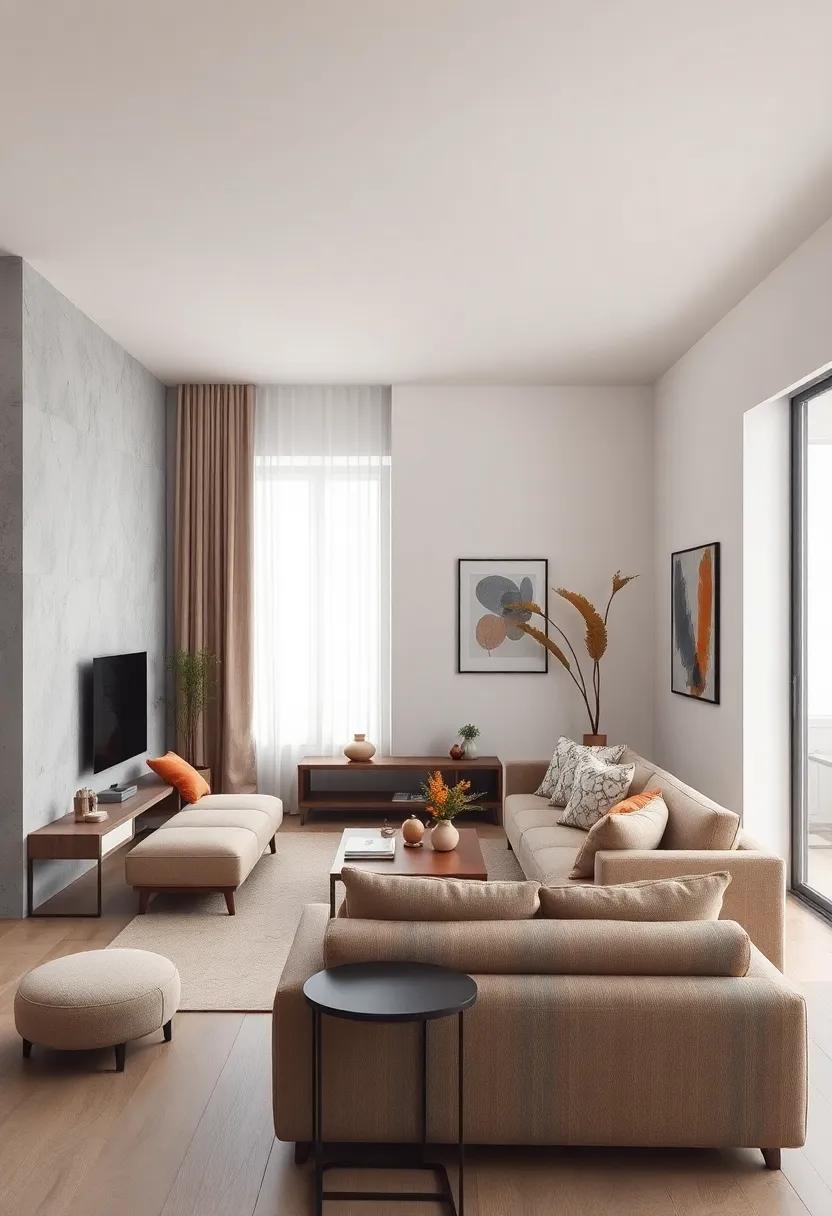
In a minimalist small living room,technology can often feel out of place,but with thoughtful integration,it can enhance both functionality and aesthetics. The key is to blend gadgets seamlessly into the design, ensuring they remain unobtrusive yet accessible. Consider the following elements to achieve a complex balance:
- Wireless solutions: opt for wireless speakers and charging stations that eliminate the clutter of cords.
- Smart Home Devices: Use smart thermostats and lights that can be controlled by your smartphone, allowing for streamlined design and energy efficiency.
- Compact Furniture: Look for side tables with built-in charging ports, merging form and function.
the goal is to create an environment that feels airy and uncluttered while still accommodating modern conveniences. Decorative shelving can serve a dual purpose, providing platforms for both books and sleek tech like small monitors or tablets. To illustrate this concept, here’s a simple comparison table showing different tech solutions and their minimalist advantages:
| Technology | Minimalist Advantage |
|---|---|
| Smart Speakers | Compact design with voice control |
| Digital artwork Frames | Rotate art while avoiding clutter |
| Multi-purpose furniture | Reduces the need for extra gadgets |
creating a seamless Flow Between Indoor and Outdoor Living
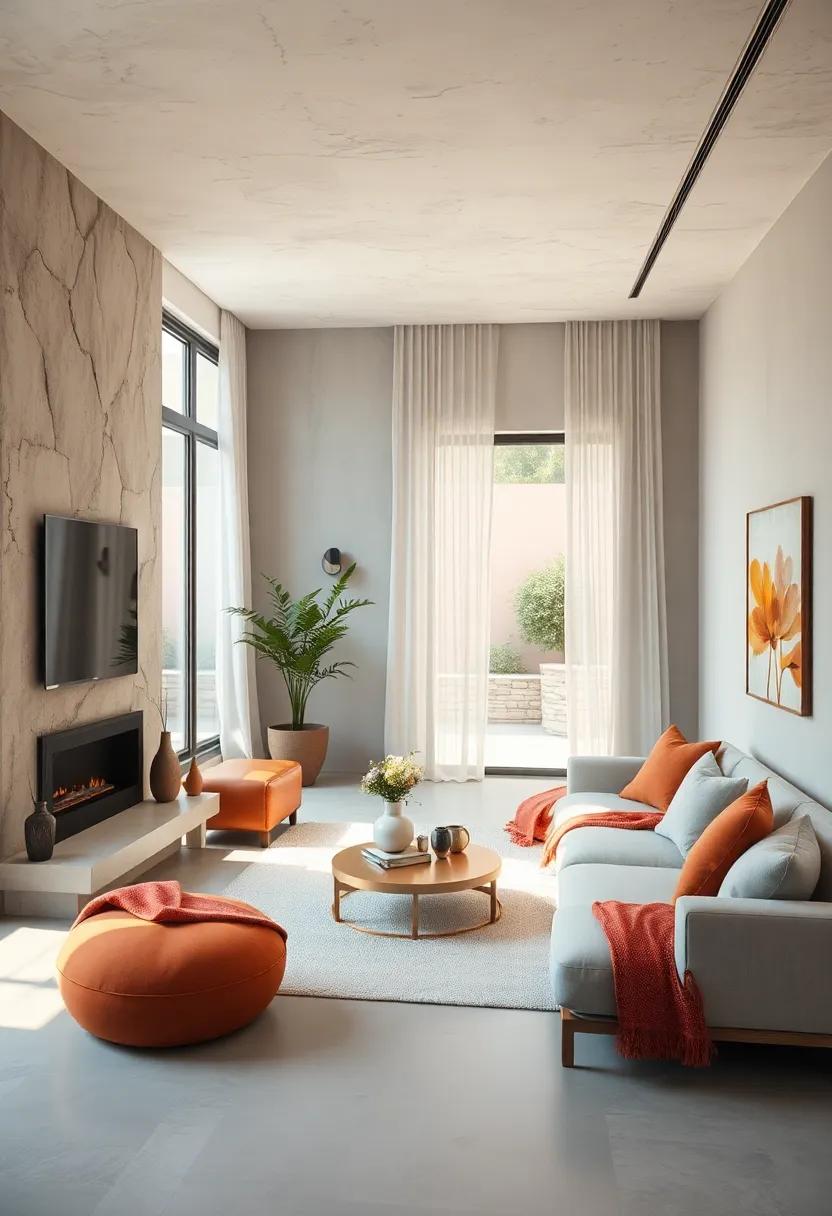
Integrating indoor and outdoor spaces can create a harmonious living environment that enhances both comfort and aesthetics. To achieve this seamless transition, consider using large windows or glass doors that act as transparent barriers, allowing natural light to flood the interior while offering unobstructed views of the outdoors. Utilizing similar flooring materials inside and out can further blur the boundaries, making your small living room feel expansive and connected to nature.A strategically placed outdoor seating area just beyond your indoor space encourages flow and makes it easy to extend family gatherings outside.
Incorporating functional elements that maintain minimalist principles is essential. for instance, a chic console table positioned near an entrance can serve both as a display for indoor plants and a place to set down outdoor gear. Adding soft, natural textiles like linen cushions or a woven throw can introduce warmth without overwhelming the space. Consider using color palettes that mirror the outdoor surroundings, such as soft greens and earth tones, to create unity. This approach not only elevates the aesthetic but also cultivates a serene environment where indoor and outdoor living experience a delightful synergy.
Utilizing Mirrors to Enhance Light and Perception of Space
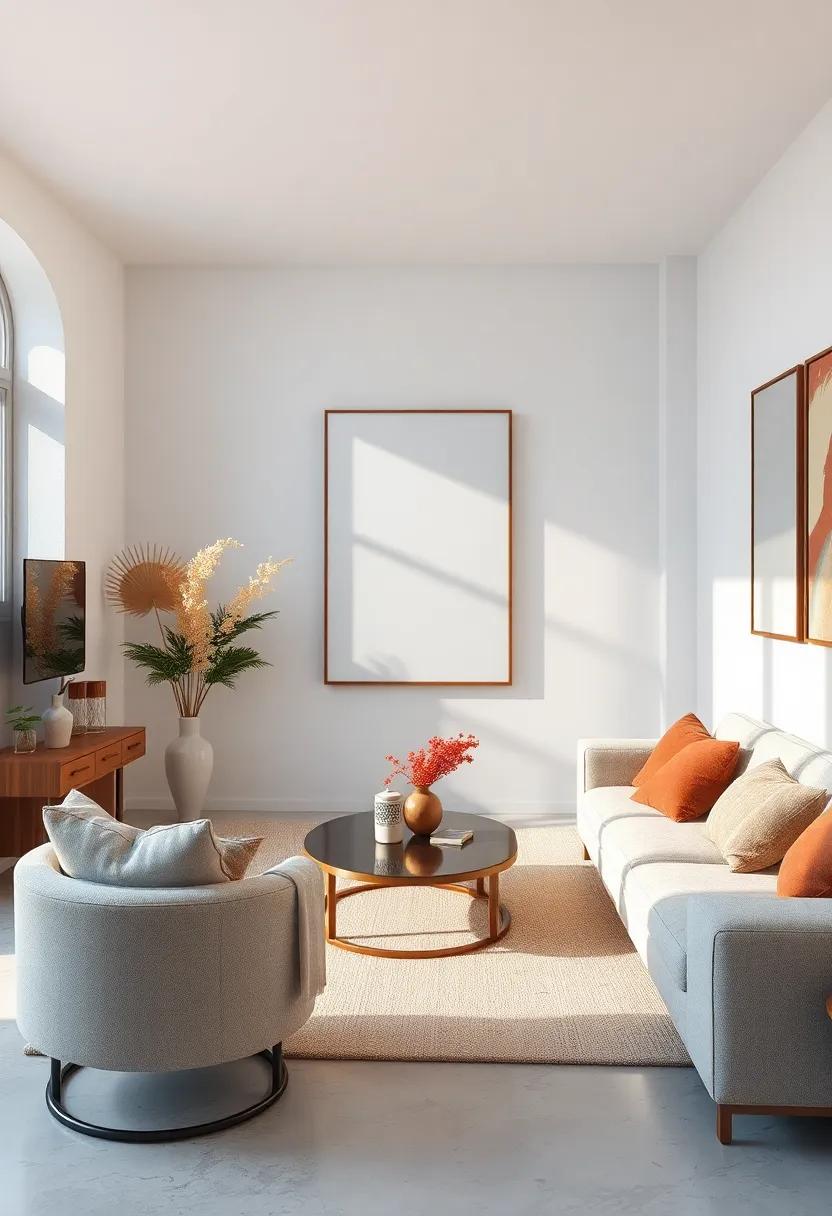
In the world of minimalist design, mirrors serve as powerful tools for creating an illusion of more space and amplifying light within a small living room. By strategically placing mirrors on walls, you can reflect natural light that streams into the room, brightening up even the coziest corners. Positioning a large mirror across from a window not only maximizes the available light but also enhances the visual depth, making the area feel open and airy. Incorporating mirrored furniture or decor elements can further reinforce this effect while adding a touch of elegance, as the reflective surfaces catch the eye and create a sense of continuity throughout the space.
Consider these options to seamlessly integrate mirrors into your design:
- Floor-to-Ceiling Mirrors: These can create a dramatic statement while making the room feel taller.
- Accent Mirrors: Smaller, uniquely shaped mirrors can act as artwork while providing reflective qualities.
- Mirrored Furniture: Pieces like coffee tables or side tables can subtly enhance the light without overwhelming the design.
| Mirror Type | Effect | Ideal Placement |
|---|---|---|
| Wall mirror | Increases light and depth | Opposite window |
| Decorative Mirror | Artistic enhancement | Above furniture or mantle |
| Mirrored Furniture | Subtle elegance | Center of the room |
In Retrospect
In the pursuit of a serene sanctuary, embracing simplicity in your small living room can transform the space into a light and airy retreat. By thoughtfully selecting a minimalist approach—where every item has purpose and every design element breathes—your living area can become a harmonious blend of functionality and elegance. As you navigate the delicate dance between space and form, remember that simplicity doesn’t equate to sterility; rather, it allows the beauty of your chosen decor to shine. So, take a deep breath, let go of the clutter, and allow your living room to reflect a calm and inviting essence. In this minimalistic journey, you’ll discover that sometimes less truly is more, creating a refuge that nurtures both the spirit and the soul.

